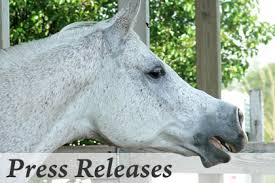You Can’t Say That! Or Can You?
- Posted by Rachel Kosmal McCart
At least once a week, Equine Legal Solutions receives a call or e-mail from someone wanting to know whether they have a good case against someone else for slander. In almost all cases, the answer is a solid “no”! Our U.S. Constitution and its amendments guarantee broad freedom of speech and freedom of the press, and the exceptions to those important rights are generally very narrow.
What are Slander, Libel, and Defamation?
Defamation of character includes the civil offenses of libel and slander. Note that these defamation offenses permit the injured party to sue for damages, but they are not crimes. Someone has slandered you if they have made oral statements that injure your reputation and/or business, and they either knew that those statements were not true; or they were reckless about whether the statements were true. For example, if you have a perfectly sound horse for sale, and a rival trainer down the road tells a prospective buyer, “That horse has navicular,” and the prospective buyer tells you that they are not interested in buying the horse because of what the rival trainer said, the rival trainer has committed slander. Libel has the same elements as slander, only the statements are made in print (or on the Internet) instead of orally. If the rival trainer had sent that comment in an email instead, it would have been libel instead of slander.
Why Aren’t There More Lawsuits for Defamation?
The horse industry is highly dependent upon personal reputation, and catty gossip is rampant. Why aren’t there more lawsuits for defamation? One key reason is that truth is a nearly absolute defense–if the statement is true, you can’t sue. In the example above, if your horse actually had navicular, you wouldn’t be able to successfully sue the rival trainer for slander. Another reason is that opinions are protected free speech. If the trainer had said, “I think that horse might have navicular,” that statement would be the trainer’s opinion and therefore not considered slander.
You Have to Be Able to Show Damages
Hurt feelings aren’t enough–you have to be able to prove economic harm. If one of your boarders spreads a rumor that your stall cleaners are beating the horses, and several of your boarders leave as a result, you can show economic harm if those stalls stay empty (but not if you have other boarders on a waiting list to take their place) and you can prove that the boarders left because of the rumor.
At What Price Truth?
Even if your situation meets all of the legal elements of libel or slander, does it make sense to bring suit? Your professional reputation should be strong enough to withstand ordinary gossip, and defending yourself against rumors can make you look defensive and give the rumors more credence than they deserve. Consider that most nasty rumors eventually die out on their own as the gossips move on to new topics, but rumors will live on indefinitely if they are the center of a court battle. Consider also the price of bringing suit vs. the measurable amount of economic harm you have suffered–are the legal fees and court costs worth the price (not to mention the emotional energy)? Finally, consider that unlike supermarket tabloids, most barn gossips are not rich–even if you get a judgment against them, it may be very difficult to collect.
A Cost-Effective Solution
Suppose you have a situation like the navicular rumor above where you are being economically harmed, and you know the source of the rumor.Many of our clients have found self-help to be extremely effective. You can crisply and professionally approach the source of the rumor, explain that it has come to your attention that they are spreading the rumor, inform them that the rumor is not true, and let them know that if they do not refrain from spreading the rumor further, you will consider legal action. In many cases, you may be too furious to approach the source of the rumor yourself without risking losing your temper, and in those instances, you may find it helpful to have your attorney send the rumormonger a cease-and-desist letter
Create a free account with TheHorse.com to view this content.
TheHorse.com is home to thousands of free articles about horse health care. In order to access some of our exclusive free content, you must be signed into TheHorse.com.
Start your free account today!
Already have an account?
and continue reading.
Written by:
Rachel Kosmal McCart
Related Articles
Stay on top of the most recent Horse Health news with













One Response
re: You Can’t Say That! Or Can You?
Many years ago, I worked on horse farms. Most of my employers were good people, but one situation was very trying. After more than a year of putting up with all sorts of abuses (to me and the horses) one incident pushed me over the edge and I quit. I w